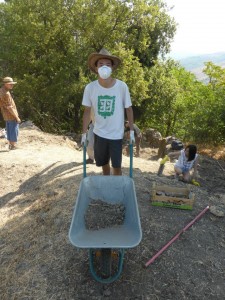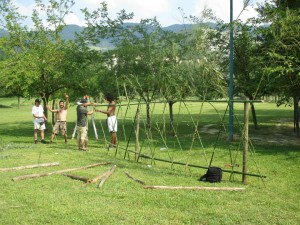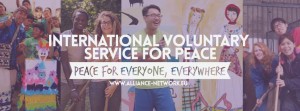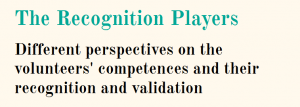As starting point in the creation of the I’VE system, we have developed two international researches which allowed us to understand how the competences have been evaluated, recognized and validated so far in other contexts than schools, universities and professional courses.


Every year about 30,000 people take part in international volunteer projects, it is a community of volunteers on the move, who share an incredible experience in some ways unique. But as organizations who are able to mobilize hundreds of local communities and thousands of volunteers, we have the perception that in many cases these experiences can really change things, to build new bridges of solidarity and friendship, to give a jolt to personal journeys and to bring into play new energies and skills.
Therefore, in the search for a system of recognition of competences developed during voluntary service projects, we wanted to involve the same volunteers, project coordinators, organizers and managers of international networks.
After studying the literature on the topic of skills in the context of volunteering with the Desk Research, we conducted a field study that has seen volunteers as protagonists: thanks to them – and to the other stakeholders – The Field Research is full of ideas, suggestions and criticisms that have allowed us to build the next steps of the project on solid foundations. For this we thank the 2500 volunteers worldwide who helped us and who wanted to contribute to this quantum leap of the movement of international volunteering.
The data were collated between February and May 2015, the Reports were published in June 2015.
I’VE Desk Research Report -Output 1
Abstract
This study examines how the organisers of international voluntary camps understand the competencies gained in participating in international voluntary service and what means there are for recognizing and validating these competences. The analysis is based on the answers given from the view point of Belgium, the Czech Re public, Finland, Italy, Mexico, Russia, Serbia, South Korea, Spain and Turkey, as well as analyzing EU-level documents. The definition of competences in the study is based on KSA model, which analyses competences as clusters of knowledge, skills and attitudes. According to the results, there are several competences learnt in international voluntary work. The competencies learnt were divided into three different categories, psychological, social and cultural. The first category refers to skills, knowledge and attitudes on the individual level; the second category to the socio- psychological dynamics,, such to working in a group, finding a role for oneself and being able to engage with peers; the third to an understanding of wider cultural and economic contexts of society, and the ability to understand otherness and diversity in a global and inter-connected world. There were five distinct ways of evaluating and recognizing competences.
public, Finland, Italy, Mexico, Russia, Serbia, South Korea, Spain and Turkey, as well as analyzing EU-level documents. The definition of competences in the study is based on KSA model, which analyses competences as clusters of knowledge, skills and attitudes. According to the results, there are several competences learnt in international voluntary work. The competencies learnt were divided into three different categories, psychological, social and cultural. The first category refers to skills, knowledge and attitudes on the individual level; the second category to the socio- psychological dynamics,, such to working in a group, finding a role for oneself and being able to engage with peers; the third to an understanding of wider cultural and economic contexts of society, and the ability to understand otherness and diversity in a global and inter-connected world. There were five distinct ways of evaluating and recognizing competences.
I’VE Field Research Report – Output 2
Abstract
The I’VE field research focused on issues of how to measure and testify learning experiences gained by young people in workcamps. The oral and written survey involved 1.889 volunteers, 219 workcamp leaders, 53 workcamp organizers, 17 local partners, 8 youth workers and 14 employers from 51 countries. Most respondents explicitly or implicitly welcomed a tool for a structured validation of the learning impacts of workcamps. However, a minority of volunteers and camp leaders expressed their concern, that the spirit of workcamps may been dangered by applying a tool with the aim of measurable and marketable outcomes. Therefore the participation in the assessment and recognition process should in no way be compulsory.
 A large number of volunteers, camp leaders, workcamp organizers and local partners agree onthe extent to which competences are gained in workcamps. The most important competences identified are teamwork and relationship competencies; openness and tolerance; inter-cultural competences, global understanding and understanding diversity; communication competences; skills in a foreign languages; and cultural awareness and competences. Some of them are allotted a prominent role in the further studies and career of youngsters. Employers add entrepreneurship, innovation and taking initiative to the list of especially important competences for a career. Youth workers confirm a competence gain for youngsters with fewer opportunities, though at a slightly lower level.
A large number of volunteers, camp leaders, workcamp organizers and local partners agree onthe extent to which competences are gained in workcamps. The most important competences identified are teamwork and relationship competencies; openness and tolerance; inter-cultural competences, global understanding and understanding diversity; communication competences; skills in a foreign languages; and cultural awareness and competences. Some of them are allotted a prominent role in the further studies and career of youngsters. Employers add entrepreneurship, innovation and taking initiative to the list of especially important competences for a career. Youth workers confirm a competence gain for youngsters with fewer opportunities, though at a slightly lower level.
Volunteers, camp leaders and workcamp organizers are familiar with peer assessment methods in terms of discussion groups. Peers being ‘witnesses’ of competence gains were considered an important function. The digital approach of the I’VE tool in validating the newly acquired competences is much appreciated by the responding volunteers, camp leaders and local partners. Some employers recommend to complement the list of personal, social and intercultural competences by technical and theme-related competences.






